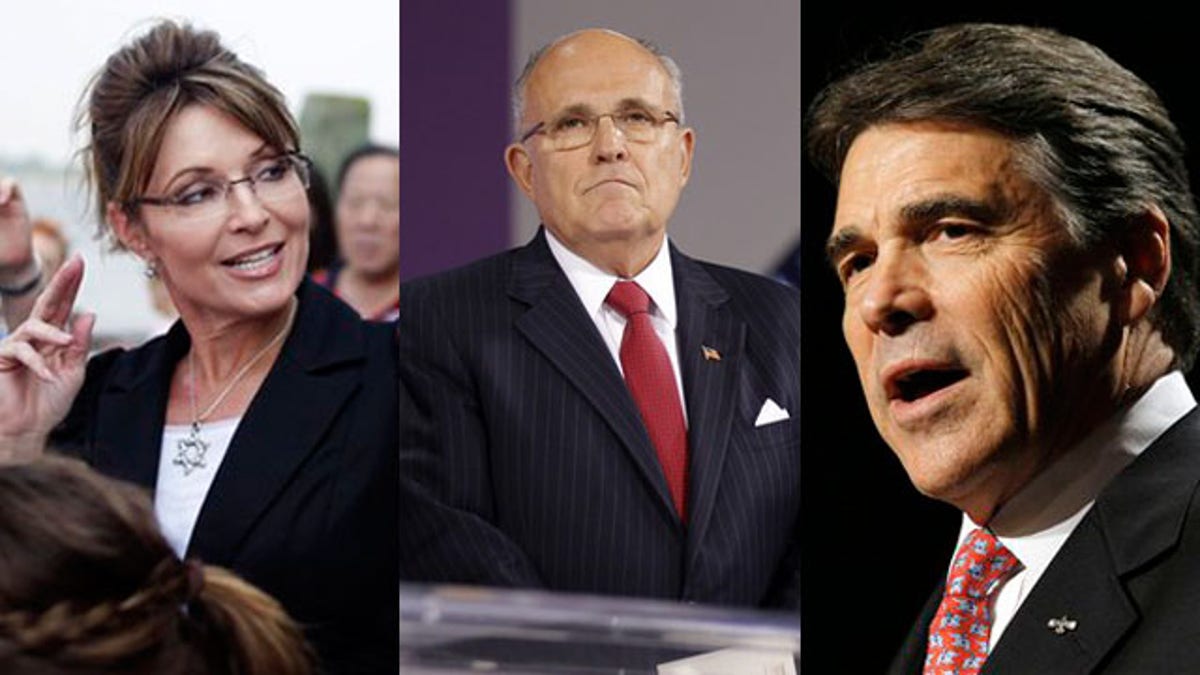
Shown here are former Alaska Gov. Sarah Palin, left, former New York City Mayor Rudy Giuliani, center, and Texas Gov. Rick Perry. (AP/Reuters)
The 2012 election cycle has been renowned for candidates taking their sweet time to enter the race. Minnesota Rep. Michele Bachmann, for all the buzz she generated, only kicked off her campaign Monday. Michigan Rep. Thaddeus McCotter, until now a hold-out, plans to announce his bid Saturday.
And somewhere out there, Texas Gov. Rick Perry is thinking long and hard about taking the plunge, while Sarah Palin and Rudy Giuliani keep the public guessing.
But time is running out to make a decision. With Thursday marking the end of the second fundraising quarter, donors are well on their way to picking candidates and investing in them. Announced candidates are well on their way to setting up a fundraising infrastructure to absorb, and keep absorbing, that support. There's nothing to stop donors from hedging their bets and backing another contender once primaries begin, but the ability of tentative candidates to claim their share of the pie can fade the longer they wait, strategists say.
"The race is going to start in earnest over Labor Day," Democratic strategist Dan Gerstein said. Considering August can be a bad month for fundraising and base-building, he said the end of July marks a "natural cutoff point" for entering.
As it happens, Perry reportedly is looking to make a final decision sometime this month. Fortunately for him, the three-term governor has a brand -- a socially conservative, jobs-focused executive with a flair for headline-attracting comments.
But Brad Blakeman -- a former adviser to President George W. Bush, also once a Texas governor -- said Perry needs to get going "quickly" if he wants to be competitive. Waiting too long puts any candidate at a disadvantage in terms of fundraising and organizing, he said, and it also raises questions among donors about whether he or she is committed to the cause.
"A candidate who has not announced by November is someone who I don't think anybody can take seriously, because by then the other candidates will have had a great opportunity to fundraise and to organize," he said. Blakeman said the same goes for Palin and Giuliani.
Blakeman and Gerstein both said Palin has the cushion of an existing fundraising operation and base. For Giuliani, they said the challenge of a late entry is even tougher because of bad memories among potential donors about the way he ran his 2008 campaign -- pinning his hopes, misguidedly, on the Florida primary.
As field-watchers consider their options, those who are all in are already boasting about their second-quarter numbers.
Former Massachusetts Gov. Mitt Romney is expected to be close to the $20 million mark, though the campaign admits it will not quite hit that number.
In the non-Romney fundraising tier, Texas Rep. Ron Paul's campaign said it reached $4.5 million and is still counting checks. Former Minnesota Gov. Tim Pawlenty's campaign said it raised $4.2 million in the second quarter. Former Utah Gov. Jon Huntsman reported raising just over $4 million, though about half of that came from Huntsman's own pockets.
Bachmann spokeswoman Alice Stewart said the campaign would release its numbers on July 15, when everyone's finances are scheduled to go public.
"Fundraising is important but hasn't been our focus as of yet," she said.
On the other side, President Obama's campaign was looking to raise $60 million. One Democratic official, while not revealing the totals, told Fox News on Thursday that the campaign has attracted more than 450,000 donors so far.
For late-bloomer candidates, there's good news in the second-quarter figures. Compared to 2007, they're not that impressive, meaning an inspiring candidate potentially could draw out those untapped dollars later on.
At this point in 2007, Obama had raised $32 million and his chief opponent, Hillary Clinton, had raised $21 million. Even then-New Mexico Gov. Bill Richardson had raised $7 million. On the Republican side, Romney also had raised $21 million, but the other candidates held their own: Giuliani reported $17 million and Sen. John McCain, the eventual nominee, hauled in $11 million.
But this year, Gerstein said it won't be long before the fundraising potential gets locked down.
"We are getting close to that point where unless you are really an exceptional candidate ... then, yes, they would be at a real distinct disadvantage competitively," he said.












































